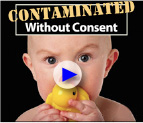Contact: Serena Ingre, 415-875-6155, cell: 703-296-0702
August 17, 2009
Toxic Chemical Threat: FDA Needs to Get BPA Out of Our Food
Scientific Studies Enough to Warrant Action
San Francisco, CA — Scientists, physicians, consumers and other environmental health advocates today responded to a U.S. Food and Drug Administration staff presentation to the Science Advisory Board on the progress of the agency's review of bisphenol A (BPA), a toxic chemical and synthetic sex hormone linked to reproductive harm, altered brain development, cancer, diabetes, heart problems and other illness. Last fall, the Science Advisory Board criticized an earlier FDA determination that use of BPA in food contact products was safe.
Jen Sass, Ph.D, Natural Resources Defense Council, attended today's FDA meeting. "While the final report is not due until November 30th, we are glad that they will be including biomonitoring studies and other health studies ignored in previous evaluations of BPA. Representatives from manufacturers who use BPA certainly turned out in force today." Accusations of industry influence on FDA decision making on BPA plagued the agency last year.
“The science on BPA is extensive and deeply troubling,” said Janet Nudelman of the Breast Cancer Fund. “We’re encouraged that the FDA is re-assessing the safety of this toxic chemical, and we urge them to take into account all of the credible, peer-reviewed research on low-dose exposures.”
Advocates say that scientific studies point overwhelmingly to a ban on this chemical in food. Dr. Sarah Janssen, with the Natural Resources Defense Council, said: “Under new leadership, FDA has the opportunity to demonstrate that their evaluations can be based on the full scope of scientific evidence. The weight of evidence suggests that BPA is not safe in our food supply and exposure puts the public, especially children, at risk.”
Environmental health experts are concerned about industry’s influence on regulating BPA, in light of Congressional investigations specifically about BPA. Documents uncovered by the Milwaukee Journal-Sentinel disclosed heavy reliance on American Chemistry Council staff by FDA's past leadership and FDA’s own scientists’ revelations about industry influence on a broader level in a 2006 poll conducted by Union of Concerned Scientists.
Suffolk County, New York, enacted the first ban on BPA in children’s products in the U.S. Just last week, two more New York counties -- Albany and Schenectady County — joined Suffolk in taking action against BPA by voting unanimously to end the sale BPA-based baby bottles and sippy cups. New York State legislation restricting BPA is pending, and Senator Dianne Feinstein, D-Calif., and New York State Senator Chuck Schumer introduced bills to restrict BPA in Congress along with a similar action by Rep. Edward Markey, D-Mass., in an amendment to the Food Safety Bill that gives FDA a deadline to evaluate BPA. Markey’s home state, Massachusetts, just issued a warning advising pregnant women and young children to avoid BPA-based products, including baby bottles and canned foods.
Restrictions on BPA have been enacted by the City of Chicago, Minnesota, Connecticut with legislation pending in California and Wisconsin. Canada has declared BPA a toxic chemical and politicians in France are proposing a ban.
Congressman Markey states on his website: “It is clear that BPA poses serious health risks, especially to children. Chicago’s decision adds to the momentum building across the country in support of a nationwide ban. Congress should quickly ban this toxin from all food and beverage containers so that parents can feed their children without worrying about poisonous chemicals.”
“Shoppers are refusing to buy BPA containing products that could put their families at risk," commented Urvashi Rangan, Ph.D., a toxicologist with Consumers Union. "But shopping discretion alone is not enough to protect the public. All consumers deserve the same protection from this harmful chemical. The FDA needs to act now.”
Earlier this year in an unprecedented move, BPA manufacturer Sunoco announced it would refuse sales of BPA to manufacturers for products where children could be exposed to the chemical.
Available for Interviews
- Sarah Janssen, MD, PhD, MPH is a scientist in the Health and Environment program at Natural Resources Defense Council, 415-875-6100.
- Jennifer Sass, PhD, senior scientist, Natural Resource Defense Council, 202-289-6868.
- Janet Nudelman, Director of Program and Policy for the Breast Cancer Fund. To schedule an interview with Janet Nudelman, please contact Shannon Coughlin, 415-336-2246.
- Urvashi Rangan, PhD, Senior Scientist & Director of Technical Policy for Consumers Union, 646-594-0212.
- Bobbi Chase Wilding, Organizing Director, Clean and Healthy New York, 518-708-3875.
- Mia Davis, former Co-Coordinator, Workgroup for Safe Markets, 617-338-8131, x201.
- Kathleen A. Curtis, Policy Director, Clean and Healthy New York, a project of Women's Voices for the Earth, 518-669-8282, cell: 518-355-6202 (home office) http://www.clean-ny.org.
Resources
- Chemical Offender: Bisphenol A – Breast Cancer Fund
- Baby's Toxic Bottle Report (including BPA fact sheet) - Center for Health, Environment and Justice
- Is It In Us? Biomonitoring study shows BPA contamination in the bodies of 35 people nationwide
- SAFER States – Bisphenol A
- SaferCans.Org
- Congressman Waxman and Stupak Request FDA Review of BPA Decision
- Dingell, Stupak Continue "Science for Sale" Probe Request Consulting Firm Case Studies (Weinberg Group possibly misled public on BPA)
- Union of Concerned Scientists FDA Scientists Survey
# # #




